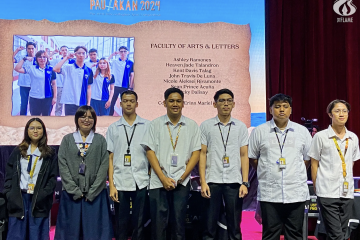by JANIS JOPLIN MOISES
THE DEPARTMENT of Philosophy and the Graduate School of Philosophy have committed to uplift women philosophers and their contributions to the flourishing of the most male-dominated field in humanities; Philosophy—a philosophy instructor said Thursday in a webinar titled “Women & Phenomenology.”
Women struggle to thrive in the field of Philosophy due to the existing aristocracy of sex, Gina Opiniano quoted from a professor from the College of London.
“We’re thankful for the crafting of this class that makes possible endeavors to examine things as what appears to us and it’s appearing, and our conscious experience as experience. These are thoughts we extracted from the few brave, brilliant, [and] inspiring women phenomenologists who have made sure that some sort of balance was possible in philosophy,” she said.
The University, along with philosophy organizations in the country and independent scholars, have taken the initiative to anchor the goal of eliminating such aristocracy in the said field, Opiniano said.
Phenomenology, done especially by women scholars, is an underexplored and underdeveloped philosophic theme in the University which urged the graduate school of Philosophy to host the webinar, Philosophy department chair Assoc. Prof. Jovito Cariño said.
Assoc. Prof. Fleurdeliz Altez-Albela explained that Phenomenology calls for the conscientious reflection of experiences which she quotes, “Consciousness is, and will always be a consciousness of, which highlights the value of object and content of the mind.”
Women of early Phenomenology
Hedwig Conrad-Martius was one of the first women to pursue a university education and was recognized as one of the greatest natural scientists and philosophers during her lifetime, according to Randolph Dible II, a professor from St. Joseph’s College New York.
Conrad-Martius debuted internationally in 1912 with an essay that won a prize at the Göettingen University’s centennial essay competition which soon became part of her dissertation. However, some members of the committee believed that a career in philosophy was not appropriate for a woman—which barred her from obtaining a doctorate in Göettingen.
She acquired her doctorate with a summa cum laude distinction in 1912 when she brought her dissertation to Munich. In 1958, she quoted during her acceptance speech for the Order of Merit that “a male student would certainly have achieved an exception.”
Conrad-Martius and the Göettingen circle set up a phenomenology library and archive where she collaborated with German philosopher Edith Stein—who she became the godparent of upon Stein’s baptism and conversion to Christianity.
Stein’s manifestation of the realm of Phenomenology in search for the truth of her being contributed to the transformation of philosophical approaches in the 20th century, according to Fr. Francis Payo from the Colegio De La Purisima Concepción.
However, her scientific method toward the search for the truth of human beings was not successful which urged her to venture toward a spiritual approach and soon consumed by the Christian faith, he added.
“It was her engagement with scientific truth, philosophical truth, and soon the truth of Christian faith, where she found the ultimate purpose and profound meaning of her being,” Payo said. F



